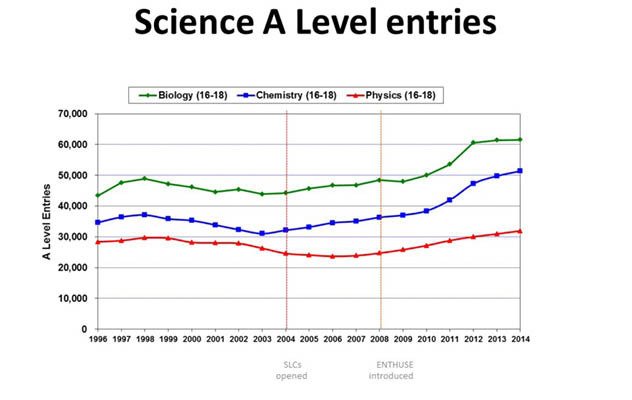
Dear Madam/Sir,
With the general election right round the corner, education is a hot topic and everyone is talking about the ever-rising need for STEM skills (science, technology, engineering and mathematics). We all know that better science and mathematics teaching in schools is critically important for the UK economy, AND essential for the futures of all our young people.
But it’s not all doom and gloom, let’s keep sight of improvements in this area since Gareth Roberts’ 2002 “Set for Success” report on the role of science and mathematics in the UK. We’ve seen an increase in numbers of science and mathematics A levels taken. There are more vocational paths to science and engineering jobs than ever before. National and regional businesses are working hard to engage with schools and parents so that they know what their career choices are in UK industries. There’s an active public debate about how science and mathematics are taught, and where we need to make changes.
The National Science Learning Network and National STEM Centre are at the forefront of this debate. Our vision is for a world-leading science and mathematics education for all young people in the UK, no more, no less. We have pulled out five wishes that the next Secretary of State for Education needs to address so that we can achieve this for the benefit of all.
- Show teachers that they matter, and inspire them to stay in the profession.
Right now the UK has the highest rate of dropout among new teachers in ten years. The last two years have seen massive changes in the curriculum and as a result lots of extra paperwork for teachers to prove they are doing a good job. The Department for Education is looking into teacher workloads currently – let’s lighten the load and get the teachers back to what they love: teaching! We can also show teachers that their career is valuable through well-supported professional development and recognition schemes. We are working with subject associations and the emerging College of Teaching to make this a reality.
- Help teachers to help children by increasing knowledge about science, technology and engineering jobs, and how to get those jobs.
The working world is changing fast, and within schools it is not easy to stay on top of all the options for school leavers. Better ties with industry, especially businesses that are located near to schools, is a great way to keep teachers and parents informed. Inspirational industry placements for teachers, like our Teachers Industrial Partners’ Scheme (TIPS), helps build these links and educate teachers about the options. Typically schools focus on traditional career and academic routes – however these are just not relevant for the 50% of children that will not go to university. We need to continue to create and communicate a range of flexible routes through further education to make sure there are opportunities for young people at different skill levels.
- Attract more girls into science and engineering careers.
Getting more girls into science is part of much bigger debate about science and mathematics where these essential skills are STILL seen as the domain of an elite (traditionally male) subset of students. We know that employers need science, mathematics, computing and engineering skills at a range of different levels and in a range of different jobs – but are the students and their parents aware of the options? Good career advice can help all children and their parents understand all the choices available to them and stop closing doors due to unconscious bias. We believe that it is essential to engage and inspire all children about science and mathematics early on in their education so that they are keen to continue to explore these paths later on. We recommend working with the media to establish a consistent positive message about science and mathematics being accessible for all.
- Lots more hands-on science in primary schools, so that we engage and inspire all pupils about science from an early stage.
Imagine being the primary teacher who has to teach mathematics, reading, science and PE all in the same day! It’s hard to be a specialist in everything and with numeracy and literacy top of the agenda, science does not get much of a look-in. How can we reset this so that, to quote the Ofsted report of 2012, teachers can ‘first maintain curiosity’ in their pupils. “Pupils should be encouraged to recognise the power of rational explanation and develop a sense of excitement and curiosity about natural phenomena”. We’d like to see ALL primary schools and their teachers supported to undertake subject specific professional development to increase their confidence and expertise in teaching science.
- Guarantee all our children the right to excellent science and mathematics teaching at every stage of their education.
This is the biggest challenge we face. Too many children in the UK do not have access to science teachers that are expert in their field. And without that access, those children’s future choices are radically affected. We need help from the government to encourage more mathematics and science graduates to come and teach in our schools. Our teachers should then be supported throughout their careers to engage with professional development and high quality resources (such as those available through the National STEM Centre) that keep them on top of their game – so that they are fully aware of the latest advances in their field and can effectively communicate their excitement to the students they teach.
Yours faithfully
Yvonne Baker
CEO Myscience
